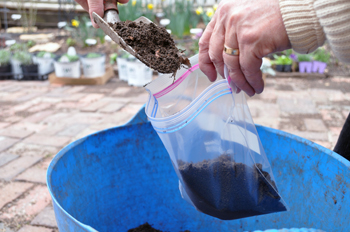Soil Testing
What is a soil test?
A soil test measures soil pH and available nutrients in the soil. It cannot identify insects, diseases, or chemical pollutants, and cannot answer questions about soil composition, drainage or compaction.
Why test the soil?
Testing the soil gives you accurate information about the type and amount of fertilizer or amendment to apply in order to maintain good plant health. This helps protect the environment, and can lead to success in your lawn and garden.
Can I get the free soil test?
Johnson County residents receive a free soil test each calendar year.
- Important Note for Johnson County Residents Wanting a Free Soil Test: Please do NOT send your sample directly to the K-State Soil Lab in Manhattan, Kansas. If you do, you will be charged by the university.
- The offer for one free soil test is only available for samples that are processed through our office.
- Bring two cups of soil in a plastic zipper-storage bag to our office.
- Write your name and phone number on the outside of the bag.
- Print off and fill out a soil test request form to accompany your sample.
- Samples are sent to the Soil Testing Laboratory at Kansas State University. The results will be analyzed by our Horticulture agents here in Johnson County, and a report will be mailed to you.
The average time required to complete the analysis for lawn or garden samples is 5 to 6 weeks. During the spring or fall lawn renewal season, this turn-around time may take longer due to the increase in samples volume. Please take this into consideration in your planning.
Soil Test Request Forms:
Select the corresponding form below for the type of plantings in the soil you want tested. Print the form and answer all the questions as completely as possible.
To give you the best recommendations, we need to know about fertilization practices, soil amendments, mowing (turf) and any special problems in the test area.
- Agriculture Sample Information Sheet
- Flowers and Ornamentals Soil Test
- Lawns and Other Turf Soil Test
- Vegetables Fruits and Nuts Soil Test
On the forms for "Test Requested," package #1 is the most common test and the free test for Jo Co residents. Additional samples or testing have a fee associated with it. See the right hand column for more information.
Do you have a Brownfields program project-a site that focuses on sites in need of redevelopment/cleanup? The EPA has a program providing free soil testing for heavy metal contaminates. Fill out an application and wait for approval.
How to take a good soil sample:

Test results will only be as reliable as the sample collected, so proper methods are important. Follow these steps:
Using a clean shovel or soil probe, dig down to a depth of:
- 3 inches for lawns,
- 6 inches for vegetables, flowers and small fruits,
- 10 to 12 inches for trees and shrubs.
Take at least 4 - 5 samples from the area to be tested to equal two cups. Mix samples together in a clean, plastic container. Remove all plant material or debris.
- Create separate samples for each area you want to have tested.
- Avoid sampling overly wet soil, and soil that has been recently fertilized.
- Samples should be dry. Do not use heat to dry your sample.
What if I am testing agriculture fields?
Bring or mail to our office:
- Completed form,
- Bagged soil, and
- Additional payment, if needed. (Cash, check or credit card is accepted. Make checks payable to: Johnson County Extension Council.)
To: Johnson County K-State Research and Extension,
11811 S. Sunset Dr. Suite 1500,
Olathe, KS 66061-7507
Office hours: 8:30 a.m. to 5:00 p.m., Monday - Friday
Lab results
Samples are sent to the Soil Testing Laboratory at Kansas State University. The results will be analyzed by our Horticulture agents here in Johnson County, and a report will be mailed to you.
Do You Have Questions?
The Garden Hotline is staffed by trained EMG volunteers and Extension staff who will assist you with questions.
Phone: (913) 715-7050
Email: garden.help@jocogov.org